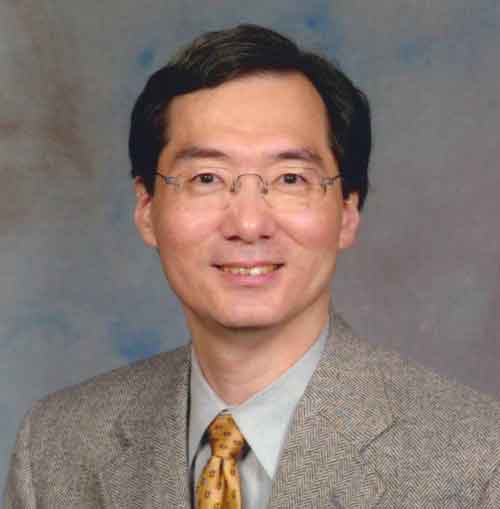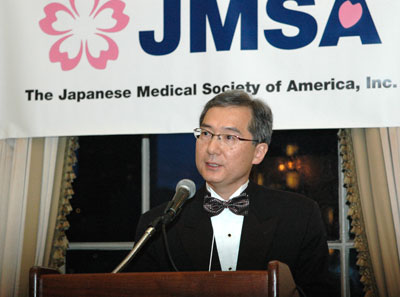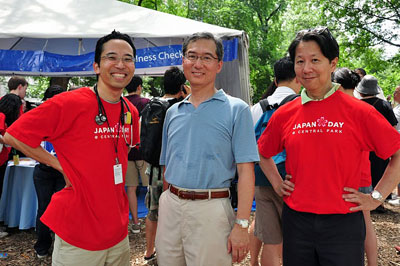
Dr. Iwahara is a gastroenterologist in New York City, and is the president of the Japanese Medical Society of America. We asked Dr. Iwahara questions about his background, gastroenterology, and his vision for JMSA.
Undergraduate: Brown University, Providence, RI
Medical school: SUNY Upstate Medical Center, Syracuse, NY
Residency: University of Rochester Medical Center, Rochester, NY
Fellowship: University of Rochester Medical Center, Rochester, NY
Current: Attending, Lenox Hill Hospital, NYC
Could you first tell us about your background? When you came to the US, where you grew up, and how you became interested in medicine and then GI?
I was born in Okayama, Japan. I come from a family in which everyone was a physician on both sides. When I came to NYC at the age of nine, my grandfather in Okayama already ran two major hospitals and a clinic. As you can see, my exposure to medicine came very early. I explored other possible fields of interest, such as mathematics and literature, but my interest in medicine did not wane and I was determined to go through the premed process when I entered college. GI was a clear choice as I like to work with my hands, love photography, and I am visually oriented.
What are the best and worst aspects of being a GI specialist?
Internal medicine and surgery were the two fields that I considered before choosing internal medicine. GI allows me to combine the two: you must think broadly as in the other subspecialties of internal medicine, but endoscopy is more similar to surgery because it is both diagnostic and therapeutic.
Some gastroenterologists fall into the trap of being just a technician in doing just procedures. GI is a broad field that requires a deep fund of knowledge, keen clinical judgment, and the skill of history taking. It is a lot more than just removing polyps and finding Helicobacter pylori.
 Could you please describe a typical week for you.
Could you please describe a typical week for you.
I practice in Manhattan, and this is a unique situation compared to the rest of the country. While doctors have been forming groups outside of NYC, there are still many solo practitioners here, and I am one of them. Since I am a gastroenterologist, I perform endoscopy (EGD and colonoscopy) two or three days a week. An anesthesiologist comes to my office on these days, and I schedule procedures every 30 minutes from 9 AM to 1:30 PM. On the other days of the week, I schedule patients for office visits and consultations. On a typical day, I am finished seeing the last patient at about 5 PM, and I spend the next two to three hours on the charts, lab test results, and telephone calls. I used to make hospital rounds before or after office hours in the past, but I now have hospitalists assume care for my inpatients so that I can concentrate on my office work. There is a recent shift towards this separation of care for hospitalized patients in NYC.
GI is a competitive specialty. Could you give advice for students and residents hoping to land a GI fellowship in the future?
Even in a community hospital such as Lenox Hill Hospital where I am affiliated, we get over 250 applications a year for two positions. Most of them are highly intelligent, motivated, and responsible people. One way to stand out from the group is to have publications in GI during your residency. Contact the director of the GI department at your medical center early in your training and start working on a research project. Usually, these directors have more ideas for research than are possible for his fellows, and he will be happy to have you work on them.
As physicians in training, we receive the majority of our training in large medical centers, with limited exposure to private practice settings. However, the majority of physicians choose to enter private practices. I wanted to take this unique opportunity to ask you a few questions regarding your practice.
First, what kind of practice setting are you in?
Solo private practice.
Second, what are the benefits and downsides of private practice?
I love the bond that is formed between the patient and the physician. The patient entrusts you with his health and life, and although this is a tremendous responsibility, it is the most rewarding aspect of being a physician. Their happiness regarding their health is what keeps me going.
The downsides are intrusion of insurance companies into our practices, long hours, high risk of legal issues such as malpractice, and high overhead cost. Also, if you become a physician with the primary purpose of being rich, you are in for a rude awaking, thanks to the control that the insurance companies and the government have over you.
Third, in your opinion, what are the top 3 elements in running a successful practice?
- You must show that you care about the patients: listen to them, find out what they are concerned about, spend adequate time with them and address their needs. This may sound simple, but you will be surprised to find out how often patients complain about some physicians who rush in and out of the examination rooms, leaving the patients dissatisfied. Also, treat all the patients in the way, whether they are CEO’s or garbage collectors.
- Surround yourself with loyal, responsible staff that is friendly and helpful towards patients. They can save a lot of time and energy for you.
- Avoid mistakes that harm patients (remember the Hippocratic Oath?). You must be meticulous and well-organized in your work. Do not overbook or try to do more than you can handle.
How and when did you learn these things?
I learned about bedside manners and the art of interviewing patients in medical school and during my training. After I finished my GI fellowship, I was fortunate enough to join my father’s practice, and we worked together for twelve years when he retired. I learned many things from him as well as from my own experience.
You have the exciting role as the new JMSA president. Could you give us a sneak-preview of what you envision JMSA’s new and/or continuing directions to be?
It is an exciting time to be the president of JMSA. We would like to increase the number of members, both locally and in other parts of the country, and network with similar societies in other cities. We will have more social activities, an example of which is golf outing which was so well-received last year that we decided to hold it twice this year. We will continue with our mission to serve the Japanese community with our community outreach program (JCOP), medical lectures that we hold three times a year, and scholarship program for medical students of Japanese ancestry. We have also increased our support of other Japanese societies in NYC with health-related issues, with our members participating in Health Week that is sponsored by the Japanese American Association and in Japan Day, to name a couple.
You have a beautiful family. How do you like to spend time with them when you’re off from your busy practice?
We like to travel as a family. Our older daughter is a student at the Rhode Island School of Design and is obviously interest in art and design. She prefers to travel to places with deep roots in art and culture, whereas our 14-year old daughter likes the wilderness of the mountains and the beaches. Last year, we visited Italy (Venice, Florence, Rome) and hiked in southwest Utah (Zion NP, Bryce Canyon NP). This year, we visited the Amalfi coast in Italy, and we plan to go to Nantucket next month. This balance seems to keep everyone happy.
Dr. Iwahara, thank you for answering our questions
It was my pleasure.
The interview was conducted via email in July 2010

